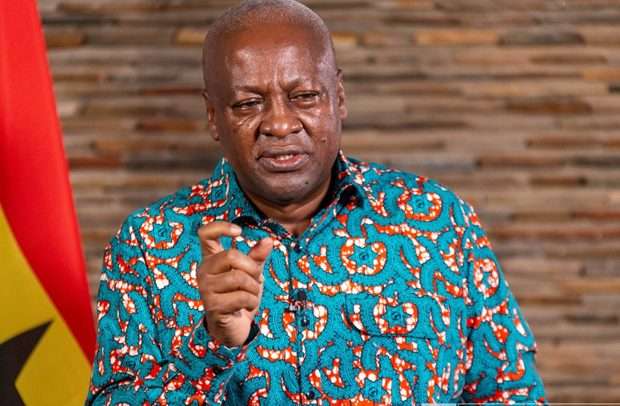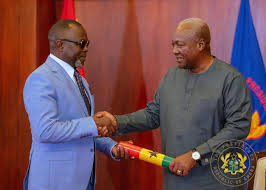In a decisive move to restore discipline and integrity in public office, President Mahama has launched a new Code of Conduct for all executive appointees, drawing praise from leading voices in law and governance.
The initiative, signaling a major step toward ethical leadership, has been hailed by constitutional law expert Prof. Stephen Kwaku Asare as both timely and essential.
Prof. Asare commended the effort, aligning it with his long-standing Operation SERVE agenda—an acronym for Standards, Ethics, Responsibility, Vigilance, and Enforcement.
“GOGO welcomes the President’s launch of the Code of Conduct for political appointees aimed at restoring integrity and discipline in public office.”
Prof. Stephen Kwaku Asare
He emphasized that the Code of Conduct represents a major step in confronting unethical behavior that has plagued public office, while simultaneously reinforcing a culture of transparency and accountability.
Meanwhile, the new directive is sweeping in scope. It applies to ministers, deputies, board members, presidential staffers, CEOs, and extends all the way to the President and Vice President.
Under the code, executive appointees are barred from accepting gifts or favors from individuals or entities with vested interests. Gifts exceeding GH₵20,000 must be declared and surrendered unless officially sanctioned.
Perhaps most significantly, it prohibits appointees and their proxies from purchasing state assets, including land, buildings, vehicles, and shares.

Another key feature of the Code of Conduct is its requirement that all appointees disclose their private business interests. The objective is to prevent conflicts of interest and ensure that public office is not used to benefit friends, family, or personal associates.
Foreign travel by appointees must receive prior approval, with travel reports submitted within two weeks of return. The message is clear: public service is not a platform for personal gain.
In line with its transparency goals, the government plans to launch a citizen reporting portal. This move opens the door for public participation in monitoring the conduct of officials.
Sanctions for breaches are severe, ranging from reprimands to suspension and outright termination. The code also mandates the declaration of assets, with defaulters facing dismissal and potential loss of salaries.
Bold Steps Toward Public Accountability
According to Prof. Stephen Kwaku Asare, the initiative is not only about internal discipline but also about reinforcing public trust in institutions.
“[The Code of Conduct] promotes integrity, transparency, and public accountability; helps reduce corruption, conflicts of interest, and abuse of office; and moves the country closer to best practices in leadership ethics.”
Prof. Stephen Kwaku Asare

However, he also stressed the need to institutionalize these values. To that end, he called for legislation that would give the code legal authority across successive administrations.
He further recommended the establishment of an independent Ethics Office with strong enforcement powers.
Additional measures proposed include annual compliance reports, mandatory training for all appointees, and legal protection for whistleblowers who use the citizen portal.
Prof. Asare praised the President’s symbolic gesture of donating two gifted vehicles to the state, calling it a powerful example of ethical leadership.
“Let’s make ethics the new normal, not just for political appointees, but for every public servant, institution, and citizen who holds power or trust.”
Prof. Stephen Kwaku Asare
He emphasized that the Code represents more than just a procedural guideline or a symbolic gesture. In his view, it is a practical and necessary instrument for upholding probity—a core constitutional value that underpins Ghana’s democratic framework.
By translating ethical commitments into actionable standards, the Code, he suggested, serves as a crucial step in reinforcing public trust and accountability across all levels of government.
Code Of Conduct Signals New Governance Era
In a rare moment of consensus, Foreign Affairs Minister Hon. Samuel Okudzeto Ablakwa echoed Prof. Asare’s sentiments.
Hon. Ablakwa, recognized for his unwavering commitment to ethical reform, welcomed the continuity of the government’s advocacy efforts from opposition, noting that they remain in step with both public expectations and moral responsibility.

“This new Code of Conduct gives further impetus to my Private Member’s Bill currently in Parliament seeking to ban politically exposed persons from purchasing state assets. State Capture is dead!”
Hon. Samuel Okudzeto Ablakwa
Meanwhile, if enforced diligently, these measures have the potential to be transformative.
They target entrenched problems that have plagued the public sector for years—corruption, patronage, and the misuse of office. However, the real test lies in implementation, as codes are only as effective as the institutions that enforce them.
The launch of the Code of Conduct signals a promising turn for governance in Ghana. It places ethics at the heart of public service and opens a new chapter in the fight against corruption.
Whether this marks a lasting shift or another short-lived initiative will depend on the government’s willingness to act decisively and consistently.
READ ALSO: UN Chief Alarmed By Israeli Military Plan For Gaza


















